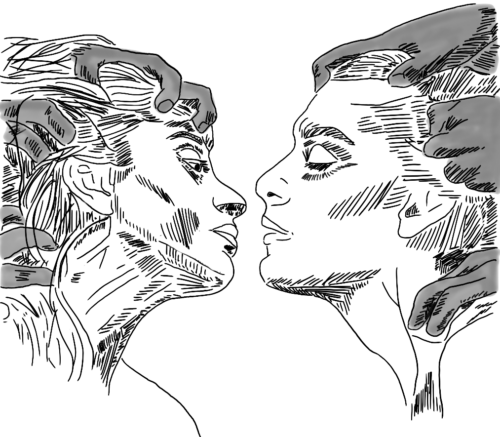I will never forget the day I figured out what lesbians were. At eight-years-old, I raced to my mother’s room after school, cuddling up next to her to join her in watching Modern Family. Two of the characters were discussing their friends who were lesbians, a word I had heard before but whose meaning I couldn’t decipher.
“Mom, what’s a lesbian?” I asked. My mom replied, “lesbians are gay women who like and want to be in relationships with other women.”
“Oh, so am I a lesbian?”
“Gogo, you are definitely not a lesbian,” she affirmed.
Intuitively, I perceived this word as forbidden. Nonetheless, I formed an acute attachment to it which would remain hidden for many years.
Growing up in a midwestern suburb in a conservative family, I learned about the LGBTQ+ community as one I was meant to accept but never be a part of myself. In middle and high school, I internalized being gay as a burden that made life more difficult, despite the fact that I, as well as my parents and siblings, had close gay friends. Assuming that my peers would feel uncomfortable at sleepovers or my extended family would look at me as the odd one out, I made a subconscious choice to never be gay.
When I started to experience sexual attraction and romance as a teenager, I exclusively pursued men. I was mostly satisfied, as my attraction to men was and continues to be extremely real. Yet I endured high school with a suppressed secret I thought I would carry with me for the rest of my life: I was more than likely attracted to women.
In the fall of my freshman year of college, I met someone that changed my perspective. A new environment where I felt I could be accepted and my first realized attraction to a woman resulted in an openly acknowledged hookup with a woman. I didn’t see it as a classic college experiment or a “phase” of exploration. But the day after it happened, I told a friend, who then shut down my excitement: according to her, I was “obviously” just experimenting and that there was no way I could actually be bisexual. Subsequently, many of the closest people in my life, including my family, forced me to question myself. For almost a year after this novel experience, I continued to hook up exclusively with men and alternated between the labels of straight and bisexual. Even in the generally liberal social culture of Harvard, I found myself suppressing my sexuality once again, conforming to the person everyone else thought I was.
Everything changed this school year. I joined new clubs and made new friends, many of whom are also a part of the LGBTQ+ community. After growing up with and starting college with mostly straight friends, having friends that made being gay feel normal transformed how I viewed my own sexuality: I could now confidently identify as bisexual. Still, only after I started openly hooking up with more women did the people in my life genuinely believe in my sexual identity.
Unfortunately, bisexual people commonly experience skepticism from others. Of students who answered the Independent’s 2022 sex survey and identify as bisexual, 65.5% of respondents disagreed or strongly disagreed with the following statement: “I feel like people take my sexuality as seriously as other sexualities.” Only 18.2% of respondents agreed or strongly agreed with the statement.
In the progressive community that Harvard is supposed to be, why did it take physical evidence to prove my sexuality? Many of the same people who discounted my own bisexuality even agree that sexual preferences exist on a spectrum. Why do people accept bisexuality only in theory?
Internalized homophobia lives within each of us to a certain extent, and we must do better. In the case of bisexual people, we are likely to experience discrimination from both straight and gay monosexual people. Many view bisexuality as a quirky kink or a desperate search for attention, adhering to the stereotypical perception that a bisexual person’s “real sexuality” only comes out when they are married. Even more than facing alienation, bisexual women face greater sexual violence and are more likely to engage in substance abuse than straight or lesbian women, according to Dr. Nicole Johnson’s study in the Journal of Bisexuality. Biphobia is a serious problem with serious consequences.
Blatant and internalized disregard of LGBTQ+ individuals will remain a problem until we continue to see more research, better media representation, and more genuine acceptance of all sexualities. For my fellow bisexual people: it’s time to be taken seriously. It’s time to stop having to convince people that our sexuality isn’t just a label.
Gogo Taubman ’24 (gtaubman@college.harvard.edu)’s favorite characters on Modern Family are Mitch and Cam.

